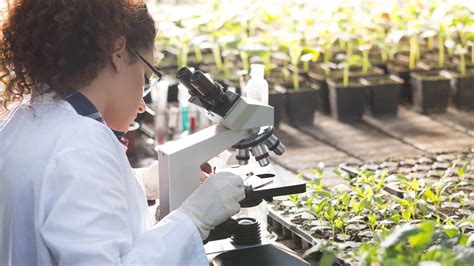Are you passionate about protecting the planet and making a difference in the world? If so, a career as an environmental scientist might be the perfect fit for you. Environmental scientists play a crucial role in understanding and addressing the complex environmental challenges facing our planet today. In this blog post, we will explore the various aspects of becoming an environmental scientist, from the educational requirements to gaining practical experience in the field. We will also delve into the important work of monitoring and measuring environmental factors, developing sustainable resource management strategies, and addressing climate change through environmental science. Additionally, we will discuss the role of environmental scientists in advocating for policy changes, promoting environmental awareness and education, and collaborating with other professionals in the field. Join us as we explore the fascinating world of environmental science and learn how you can make a meaningful impact on the planet as an environmental scientist.
Table of Contents
Understanding the role of environmental scientists
Environmental scientists play a crucial role in understanding the complexities of the natural world and its interaction with human activities. They are responsible for studying the impact of human and industrial activities on the environment, as well as developing strategies to mitigate these impacts. With a strong focus on research and data analysis, environmental scientists work to identify and address environmental issues such as pollution, climate change, and resource depletion.
Furthermore, environmental scientists often collaborate with other professionals, including policymakers, conservationists, and community leaders, to develop and implement solutions for environmental challenges. They also play a key role in promoting environmental awareness and education, advocating for policy changes, and applying cutting-edge technology in their research to protect the planet and its resources for future generations.
Moreover, understanding the role of environmental scientists also involves recognizing the need for practical experience in the field. Environmental scientists often work in research laboratories, field settings, and government agencies, where they collect and analyze environmental data, conduct experiments, and monitor environmental factors such as air and water quality. Additionally, they may also be involved in sustainable resource management, using their expertise to help organizations and governments make informed decisions about natural resource use and conservation.
In conclusion, environmental scientists are at the forefront of addressing some of the most pressing issues facing our planet today. By gaining a deep understanding of their role and the importance of their work, we can better appreciate the contributions they make in protecting the environment and fostering a more sustainable future for all.
Educational requirements for environmental scientists
Environmental scientists are professionals who study the environment and find ways to protect it. They collect data and analyze it in order to better understand the impact of human activity on the environment. It is a crucial field especially in the current climate crisis, and environmental scientists play a key role in finding solutions to pressing environmental issues.
One of the most important aspects of becoming an environmental scientist is fulfilling the educational requirements. In order to pursue a career in environmental science, individuals typically need at least a bachelor’s degree in environmental science or a related field, such as biology, chemistry, or geology. Many higher-level positions in this field also require a master’s or doctoral degree.
Advanced coursework in environmental science, biology, chemistry, and geology is usually necessary to gain a strong foundation in the field. Additionally, specific courses may be required based on the area of specialization, such as courses in environmental policy, environmental law, or sustainable resource management.
Hands-on experience, such as internships or research projects, is also often a requirement for educational programs in environmental science. This practical experience allows students to apply their knowledge in a real-world setting and gain valuable skills that are essential for success in this field. Overall, obtaining the necessary education and experience is crucial for individuals who are passionate about pursuing a career in environmental science.
Gaining practical experience in the field
One of the most important aspects of becoming a successful environmental scientist is gaining practical experience in the field. Hands-on experience allows you to apply the knowledge gained in the classroom to real-world situations. Whether it’s conducting field research, collecting and analyzing data, or working alongside seasoned professionals, gaining practical experience is essential for honing your skills and gaining a deeper understanding of environmental science.
Internships and volunteer opportunities are valuable ways to gain practical experience in the field of environmental science. Internships provide opportunities to work with established organizations and companies, allowing you to gain firsthand experience in various aspects of environmental science, such as environmental monitoring, conservation projects, and sustainability efforts. Volunteer work with environmental groups and non-profit organizations also provides valuable hands-on experience while giving back to the community and the environment.
Field work is another important way to gain practical experience in environmental science. Whether it’s conducting water quality tests, collecting soil samples, or studying wildlife populations, field work allows you to observe environmental phenomena firsthand and contribute to meaningful research efforts. It also provides valuable opportunities to collaborate with other professionals in the field, learn from experienced mentors, and develop important technical and problem-solving skills.
Ultimately, gaining practical experience in the field of environmental science is crucial for developing the skills, knowledge, and expertise needed to address complex environmental challenges and make a meaningful impact on the world around us.
Techniques for monitoring and measuring environmental factors
Monitoring and measuring environmental factors is crucial for understanding the impact of human activities on the natural world and for developing strategies to mitigate negative effects. Environmental scientists employ a variety of techniques to collect data on factors such as air and water quality, biodiversity, and climate patterns.
One common technique for monitoring air quality is the use of air quality sensors, which can detect the presence of pollutants such as carbon monoxide, ozone, and particulate matter. These sensors are often used in urban areas to track air pollution levels and to assess the effectiveness of air quality regulations.
Another important aspect of environmental monitoring is the measurement of water quality. This can be done using instruments such as water quality meters and test kits, which can measure factors like pH, dissolved oxygen, and nutrient levels. These measurements are vital for assessing the health of aquatic ecosystems and for identifying sources of pollution.
Remote sensing techniques, such as satellite imaging and unmanned aerial vehicles, are also used to monitor and measure environmental factors on a larger scale. These technologies allow scientists to track changes in land use, deforestation, and climate patterns over time, providing valuable data for environmental research and policy development.
Developing strategies for sustainable resource management
When it comes to sustainable resource management, it is essential to consider the long-term impact of human activities on the environment. Developing effective strategies involves identifying and implementing measures that minimize resource depletion and environmental degradation while meeting the needs of current and future generations.
One key strategy for sustainable resource management is the promotion of renewable energy sources such as solar, wind, and hydroelectric power. By shifting away from fossil fuels, which contribute to air and water pollution as well as greenhouse gas emissions, we can reduce our reliance on non-renewable resources and minimize our ecological footprint.
In addition to promoting renewable energy, sustainable resource management also involves conservation and efficient use of natural resources such as water, land, and forests. This can be achieved through initiatives that seek to reduce waste, improve resource efficiency, and protect biodiversity.
Furthermore, developing strategies for sustainable resource management requires a holistic approach that takes into account economic, social, and environmental considerations. This means integrating sustainable practices into urban planning, agriculture, industry, and transportation, as well as fostering collaboration among stakeholders to address common challenges and goals.
Addressing climate change through environmental science
Climate change is one of the most pressing issues facing the world today, and environmental scientists play a crucial role in addressing this challenge. By studying the impact of human activities on the environment, environmental scientists are able to identify the causes of climate change and develop strategies to mitigate its effects.
One of the key techniques for addressing climate change is through the use of cutting-edge technology to monitor and measure environmental factors. This allows environmental scientists to gather data on changes in temperature, sea level rise, and other indicators of climate change, which can then be used to inform policy decisions and develop sustainable resource management strategies.
Environmental scientists also play an important role in advocating for policy changes to protect the planet. By using their expertise to educate the public and lobby for legislation that reduces carbon emissions and protects natural habitats, environmental scientists are able to make a tangible impact in the fight against climate change.
In addition to their scientific and advocacy work, environmental scientists also play a critical role in promoting environmental awareness and education. By collaborating with other professionals in the field and sharing their knowledge with the public, environmental scientists can help to inspire others to take action to address climate change and protect the planet for future generations.
Collaborating with other professionals in the field
Collaborating with other professionals in the field of environmental science is essential for tackling complex issues and finding innovative solutions. Environmental scientists often work alongside experts in various fields, including biology, chemistry, engineering, and public policy, to address environmental challenges.
This collaborative approach allows for a more holistic understanding of environmental issues and ensures that efforts to protect the planet are comprehensive and well-informed. By bringing together diverse perspectives and expertise, environmental scientists can develop more effective strategies for environmental conservation and sustainable resource management.
Furthermore, collaboration with professionals in other fields provides opportunities to leverage cutting-edge technology and innovative techniques in environmental research and monitoring. This interdisciplinary approach allows environmental scientists to stay at the forefront of environmental research and adapt to new challenges as they arise.
Overall, collaborating with other professionals in the field is crucial for advancing environmental science and working towards a more sustainable and resilient future for our planet.
Applying cutting-edge technology in environmental research
Environmental research has greatly benefitted from the use of cutting-edge technology as it allows scientists to gather data in more efficient and accurate ways. One of the key technologies being used is remote sensing, which involves the use of drones and satellite imagery to monitor different environmental factors. These advanced tools have revolutionized the way we collect data and understand changes in the environment.
Another important aspect of applying technology in environmental research is the use of Geographic Information Systems (GIS) that allow scientists to analyze and visualize complex geospatial data. This has enhanced our ability to map and understand the distribution of natural resources, endangered species, and pollution sources, among other environmental factors. In addition, the use of advanced modeling software enables researchers to simulate different scenarios and predict the impact of potential changes to the environment.
Furthermore, advancements in DNA sequencing and molecular techniques have allowed environmental scientists to conduct more detailed studies on biodiversity, including identifying species and understanding genetic diversity. This has been crucial for conservation efforts and understanding the impact of environmental changes on different ecosystems.
In conclusion, the application of cutting-edge technology in environmental research has opened up new possibilities for understanding and protecting our planet. These tools have not only improved the way we gather data, but also how we analyze and interpret it, leading to more effective strategies for environmental conservation and management.
Advocating for policy changes to protect the planet
In the field of environmental science, advocating for policy changes to protect the planet is crucial for ensuring a sustainable future. Environmental scientists play a vital role in identifying environmental issues and proposing solutions to address them, but without policy changes, these efforts may not have a significant impact.
One of the primary ways environmental scientists can advocate for policy changes is by engaging with government officials and policymakers to raise awareness about pressing environmental issues and propose specific policy changes. This can involve presenting research findings, participating in public hearings, and collaborating with other stakeholders to develop and promote policy recommendations.
In addition to engaging with policymakers, environmental scientists can also engage with the public to build support for policy changes. By educating the public about the importance of specific environmental policies and their potential impact, environmental scientists can build momentum for change and encourage individuals to advocate for policy changes themselves.
Advocating for policy changes to protect the planet is a collaborative effort that requires the expertise and dedication of environmental scientists, as well as the support of policymakers and the public. By working together to advocate for meaningful policy changes, environmental scientists can contribute to the protection and preservation of the planet for future generations.
Promoting environmental awareness and education
As environmental scientists, it is crucial to not only conduct research and analyze data, but also to actively promote awareness and education about the importance of protecting our planet. By promoting environmental awareness, we can help to inspire positive change and encourage others to take action in preserving our natural resources.
One effective way to promote environmental awareness and education is through partnering with schools and educational institutions. By collaborating with teachers and students, environmental scientists can share their expertise and knowledge, and inspire the next generation of environmental stewards. This can involve leading workshops, giving presentations, or providing hands-on learning experiences.
Education is key in sparking awareness and driving change. Environmental scientists can work to develop and implement educational programs that focus on the importance of conservation, sustainability, and the impact of human activities on the environment. By fostering a better understanding of these issues, we can empower individuals to make informed choices that benefit the planet.
Furthermore, leveraging digital platforms and social media can be a powerful tool for promoting environmental awareness and education. By creating engaging content and sharing informative resources, environmental scientists can reach a wider audience and inspire meaningful action. Utilizing these platforms also allows for dialogue and community building, fostering a sense of shared responsibility and purpose in protecting the environment.





